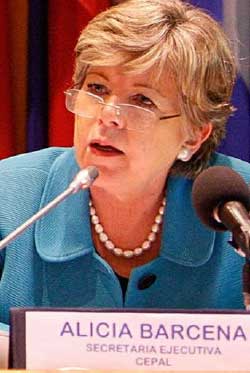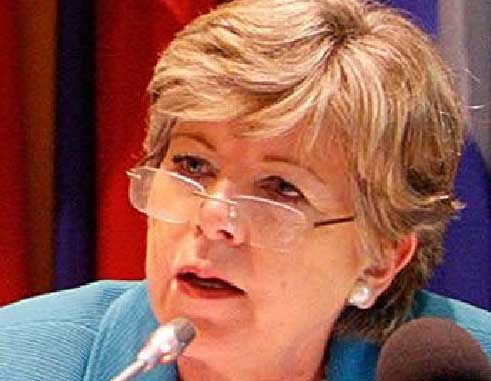
SANTIAGO, CMC – The executive secretary of the Economic Commission for Latin America and the Caribbean (ECLAC) Alicia Bárcena, says productivity remains the Achilles’ heel of regional economies.
At the opening of the first high-level meeting of the Organization for Economic Cooperation and Development (OECD) Regional Programme for Latin America and the Caribbean, Bárcena said that increasing productivity, advancing social inclusion and strengthening governance are the three priorities of the Regional Program of the Paris-based OECD.
The Regional Programme was launched in June 2016 in Paris to support Latin America and the Caribbean in advancing its reform agenda.
Chile and Peru are the first two co-chairs of the Program for the period 2016-2018.
According to the latest economic projections by ECLAC, the gross domestic product (GDP) of Latin America and the Caribbean will shrink by 0.9 percent on average this year, while in 2017 it is expected to grow by 1.5 percent.
“Our region urgently needs an environmental big push to change its development model”, said Bárcena, who called on countries to make strides in industrial and technology policies, focused on investment and innovation, in order to achieve the new Sustainable Development Goals (SDGs).
Tax evasion, she said, is another weak point in regional economies.
ECLAC estimates that, in 2015, non-compliance amounted to 2.4 percentage points of regional GDP for value added tax (VAT) and 4.3 points of GDP for income tax, representing a total of US$ 340 billion (6.7 percent of total GDP).
Bárcena also said the OECD Programme has brought together organizations that have a long history of multidisciplinary analysis of development in Latin America and the Caribbean and experience in formulating recommendations on policies and tools: ECLAC (since 1948), the Inter-American Development Bank (IDB) and CAF-Development Bank of Latin America, all members of the Steering Group.
A specific example of cooperation between ECLAC and OECD, Bárcena said, is the annual Latin American Economic Outlook report, to which CAF also contributes.
She said this year’s edition will be launched at the end of October, at the 25th Ibero-American Summit of Heads of State and Government, to be held in Cartagena, Colombia.
Popolizio reaffirmed his country’s commitment to promoting best practices in Latin America and the Caribbean “in order to achieve the 17 SDGs of the 2030 Agenda.”
He noted the support that the various international organizations involved are providing to the OECD initiative, citing, for example, “the great wealth of knowledge and statistics that ECLAC has compiled on issues in the region”.
Ramos said “the programme that we are launching is not an attempt to reinvent research on Latin American and Caribbean; rather, it aims to build on progress already made by the Latin American institutions in analyzing and understanding the regional situation”, adding that, “with the determination, know-how and desire for good policies, great things can be achieved”.











![.[L-R] Parliamentary Representative for Castries Southeast, Lisa Jawahir & Talk show host, Timothy Poleon](https://thevoiceslu.com/wp-content/uploads/2026/02/Lisa-Jawahir-Timothy-Poleon-380x250.jpg)
![Public Service and Utilities Minister Stephenson King delivered remarks [Photo credit: VP]](https://thevoiceslu.com/wp-content/uploads/2026/02/Stephenson-King-380x250.jpg)

